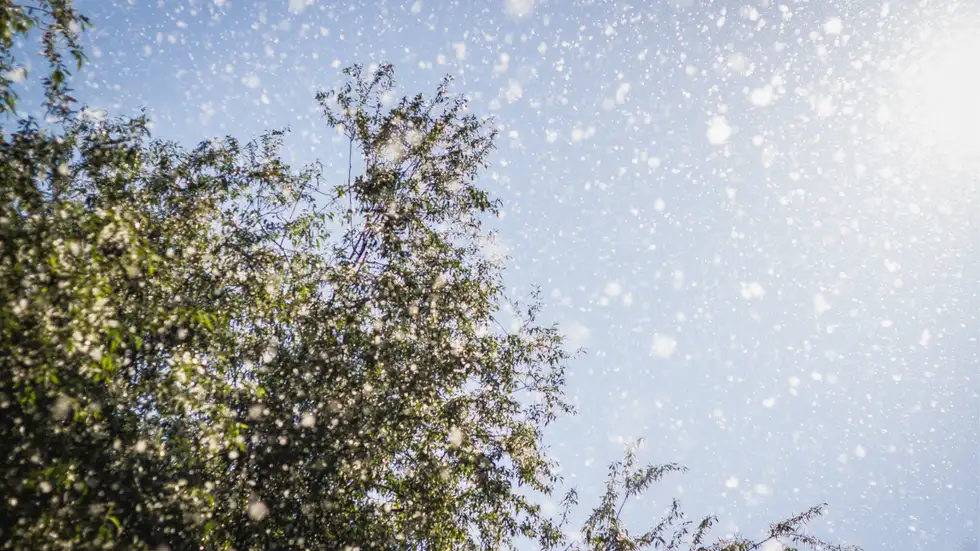It’s springtime! Most know it to be the season of bloom, however to a quarter of the population it is known as the season of gloom. A season surrounded by sneezes, runny noses, and itchy eyes.
The spring brings about flowers, trees, and fruit. On the other hand, it’s not all sunshine and rainbows, known primarily by a quarter of the population, its seasonal allergies. It is also known as “hay fever” and “allergic rhinitis”. The main cause of the fever is pollen, specifically tree pollen which kicks into high gear every early spring.
The effects of hay fever overlap with many common ailments. It is very easy to confuse it with illnesses like the common cold, the flu, and Covid. The symptoms of hay fever could affect your throat, giving you a rough, scratchy, or itchy throat.
Hay fever can also affect your eyes, some find their eyes become itchy, while for others it becomes watery. The most common symptoms will affect your nose, mainly making it runny, causing congestion, and lots of sneezing. These allergies can even make your colds worse with some postnasal drip, where it extends your sickness if you’re not careful.
Pollen is almost everywhere. The reason that some people have allergies and others don’t is because of one small mistake. For most, pollen is completely harmless, however for some people, their body will mistakenly recognize pollen as something dangerous and attempt to purge it. This is how most allergies function, it mistakes something safe for something hazardous.
Most plants produce pollen, just in varying amounts, which also depends upon the season. Consider the nickname of our state “The Evergreen State”. The evergreen tree is among the many trees that produce high amounts of pollen during the spring. The other main contributors include: Aspen, Cedar, Mulberry, Willow, etc.
Certain trees also affect fruit with their pollen, the fruits will make parts of your face itch or swell. This is called Oral Allergy Syndrome or Pollen Food Allergy Syndrome. If you have seasonal allergies you might want to look out for almonds, apples, apricot, carrots, celery, cherry, hazelnut, peaches, pears, and parsley.
Allergies are something that change over a person’s lifetime. Some people are born with an allergy, and it stays with them for their whole life. Some find that they lose their allergies once their body ages. And there are the unfortunate few who develop allergies once they get older.
However, there is a light at the end of the tunnel. You don’t just have to live with the pollen and try to condition your body. There are plenty of ways to reduce the symptoms of hay fever. These methods are split into two categories: environmental and preventive.
Your environment plays a large role in the pollen amount. When you move away from places crowded full of trees, flowers, and grass you move away from the allergy-inducing pollen. The beach is a great place to get away from pollen. The downside is that you may not have the luxury to go on a season-long vacation just to get away from the pollen.
In order to combat the pollen, you will need to get rid of the pollen. This can be accomplished by utilizing an air purifier. While air purifiers vary in minor amounts, like that hey will have different area coverages, the important part is to have a HEPA filter for the purifiers.
Since you can’t purify the entire world, you have to settle with covering your face, for that reason face masks are quite helpful. If all the pollen is still getting through, then you will have to try to fix your body, temporarily.
Allergy medicine will stop your body from reacting to the pollen which will stop or lessen the symptoms of hay fever. Allergy medicines come in different varieties, while most are in pill form, some come in the form of a nasal spray, and of course there’s liquid, however they are weaker. You can usually find the variations including gel pills, non-drowsy, and a version made specifically for children.
Overall, hay fever is a pain to deal with. A quarter of the population has to deal with it, but at least it’s only for the spring. By the way, did you know that pollen has been going up in the past years, due to spring becoming longer and thus the pollen production is elongated.
Once in a while, you should slow down, stop and smell the roses. Just be wary, there’s pollen-ty of pollen.

